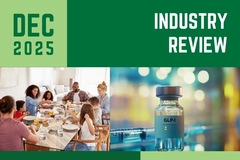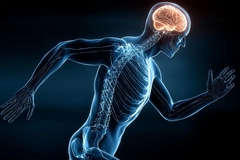
- Industry news
Industry news
Trending now
- Category news
- Reports
Trending now
- Key trends
Trending now
- Multimedia
Multimedia
Trending now
- Journal
- Events
Trending now
- Suppliers
Suppliers
Trending now
- Home
- Industry news
Industry news
Trending now
- Category news
- Reports
Trending now
- Key trends
Trending now
- Multimedia
Multimedia
Trending now
- Events
Trending now
- Suppliers
Suppliers
Trending now
International Literacy Day: EUFIC prioritizes science in new campaign to promote a healthier society

08 Sep 2023 --- In recognition of International Literacy Day, the European Food Information Council (EUFIC) launches a campaign to empower the public in making well-informed diet and lifestyle choices by raising awareness of food and health science literacy. EUFIC highlights that science literacy is critical to promoting a healthier, more sustainable society.
EUFIC’s primary focus will be on Estonia and Poland since around 40% of their population is either “not very confident” or “not confident at all” in recognizing disinformation when they encounter it. The council will translate materials into local languages and disseminate them through local media agencies to ensure a wider reach.
“With this campaign, EUFIC aims to arm citizens with tools they can use to enhance their critical thinking skills and better identify credible nutrition information online,” Dr. Nina McGrath, content production lead at EUFIC, tells Nutrition Insight.
“As the sharing of food information grows exponentially online, so does the sharing of information from unchecked or uncredentialed sources. This can make it hard for people to identify which information is evidence-based.”
“That’s why we are sharing some simple rules of thumb that people can use to help identify which sources are credible and red flags that can help them recognize misinformation.”
Food & Health Science literacy campaign
The campaign, which will run throughout September, includes materials that address topics such as trustworthy sources and debunking common food and nutrition myths. In addition to empowering citizens, EUFIC aims to support and guide journalists and scientists in responsible and transparent reporting.
EUFIC has developed infographics on spotting fake nutrition information online, reading graphs, cognitive biases and determining the strength of scientific evidence. The campaign also includes articles on nutrition research funding, publications and levels of evidence.
 EUFIC’s campaign includes tools consumers can use to better identify credible nutrition information online.“Food misinformation can make it harder for consumers to discern which food-related advice they read is backed by science and which they can safely ignore,” underscores McGrath.
EUFIC’s campaign includes tools consumers can use to better identify credible nutrition information online.“Food misinformation can make it harder for consumers to discern which food-related advice they read is backed by science and which they can safely ignore,” underscores McGrath.
“In some cases, it can lead to food safety risks, for example, the trend of drinking raw unpasteurized milk, which increases people’s risk of getting food poisoning from bacteria like E. coli and Listeria. It can also affect diet quality and nutrient intake, for example, if people choose to cut out specific food groups based on unreliable advice they find online.”
McGrath adds that having the right tools to identify food misinformation is a crucial factor in empowering citizens in their quest for healthier and sustainable lifestyles. “We need to bridge the gap to ensure European citizens feel confident in their choices.”
“Fake news”
EUFIC notes that the uncontrolled spread of misinformation, disinformation and pseudo-science threatens citizens’ ability to make informed choices.
McGrath highlights: “Nowadays, people are bombarded with information on food and nutrition from all sides, whereas in the past, that information mainly reached them through a small number of qualified sources like healthcare professionals or national nutrition recommendations.”
The 2022 Eurobarometer survey showed that confidence in media and news varies considerably across EU member states. Estonian, Polish and Danish consumers find it harder to identify disinformation, while around 80% of Finland, Malta and Ireland respondents state they “feel better equipped at debunking fake news.”
The survey also highlights that over a quarter of Europeans think they have often been exposed to disinformation and fake news in the past seven days.
Public TV and radio stations continue to be the top trusted news sources in the EU at 49%, according to the Eurobarometer. Written press and private TV and radio stations follow at 39 and 27%, respectively.
However, EUFIC warns that the media’s potential distortion of scientific facts and frequent over-simplified or sensationalized reporting creates uncertainty while contributing to a diminished trust in authentic scientific information.
 Over a quarter of Europeans think they have often been exposed to disinformation in the past week.Science illiteracy
Over a quarter of Europeans think they have often been exposed to disinformation in the past week.Science illiteracy
EUFIC underscores that consumers can better decipher and understand the true essence of what is being conveyed through the headlines and on social media if they improve their food and health science literacy.
“In this age of digital communication and mass sharing of information, critical thinking and scientific literacy skills are more important than ever as it is often up to individuals themselves to decide whether the information is credible in a matter of seconds,” cautions McGrath.
For example, EUFIC sees more dubious claims on food beyond nutrition, such as “climate-neutral certified” labels. The organization notes these claims reach young people through social media’s food trends and challenges.
Recently, food organizations called out Nestlé UK and Ireland for the irresponsible marketing of a new breakfast cereal inspired by the candy bar KitKat. The organizations called the product’s nutrition claims inaccurate, as the cereal is high in sugar.
At the same time, research indicates that product labeling helps consumers navigate product claims and improve their diet. Examples include adding a symbol if a product is high in sugar or Nutri-Score labeling.
Beyond the campaign
EUFIC leveraged a Google keyword research analysis and surveyed its website audience to identify frequently asked questions on spotting disinformation online, which it used as inputs for its campaign.
The organization explains this approach ensures the campaign covers the community’s queries.
“Aside from campaigns like this one, another vital approach to improving scientific literacy in Europe is to work with teachers and educators to support them in improving critical thinking skills among school-age children,” concludes McGrath.
“An example is the EIT FoodScienceClass project where EUFIC collaborated with other partners to develop toolkits to support teachers in integrating food and nutrition literacy skills into their lessons.”
By Jolanda van Hal










